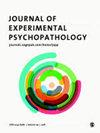Linking maladaptive food avoidance and anorexia nervosa symptoms: An analogue study
IF 1.9
4区 医学
Q4 PSYCHIATRY
引用次数: 0
Abstract
Previous research has shown that food avoidance can be learned via classical and operant conditioning. This leads to the question of whether learning deficits could contribute to the harmful food avoidance seen in individuals with anorexia nervosa. Accordingly, we tested whether healthy women with increased levels of anorexia nervosa symptoms and characteristics show learning abnormalities related to the acquisition and extinction of food avoidance behaviors. Data from a previous experiment (Spix, Schutzeichel, et al., 2023) was used and supplemented with new questionnaire data. Based on participants’ levels of anorexia nervosa symptoms and characteristics, we subtyped an analogue and a healthy group and compared their performance on a food avoidance learning task. We assessed the frequency of avoidance responses, as well as relief, frustration, eating desires, fear, and liking for the conditioned stimulus (CS) associated with food intake. The analogue group showed more unnecessary food avoidance behaviors, a greater relief about the omission of the food, and a faster and more persistent reduction in eating desires than the healthy group. There were no differences between groups in frustration, fear, and liking. Learning abnormalities might contribute to the development and maintenance of food avoidance in individuals with anorexia nervosa.将适应不良的食物回避与神经性厌食症症状联系起来:模拟研究
以往的研究表明,食物回避可以通过经典条件反射和操作性条件反射学会。这就引出了一个问题:学习缺陷是否会导致神经性厌食症患者出现有害的食物回避行为。因此,我们测试了神经性厌食症症状和特征水平增高的健康女性是否会出现与食物回避行为的获得和消退相关的学习异常。我们使用了之前的实验数据(Spix、Schutzeichel 等人,2023 年),并补充了新的问卷数据。根据参与者的神经性厌食症症状水平和特征,我们对模拟组和健康组进行了分组,并比较了他们在食物回避学习任务中的表现。我们评估了回避反应的频率,以及对与食物摄入相关的条件刺激(CS)的缓解、沮丧、进食欲望、恐惧和喜欢程度。与健康组相比,模拟组表现出更多不必要的食物回避行为,对食物遗漏的缓解程度更高,进食欲望的降低更快、更持久。组间在挫折感、恐惧感和喜欢程度上没有差异。学习异常可能是神经性厌食症患者产生和维持食物回避行为的原因之一。
本文章由计算机程序翻译,如有差异,请以英文原文为准。
求助全文
约1分钟内获得全文
求助全文
来源期刊

Journal of Experimental Psychopathology
Medicine-Psychiatry and Mental Health
CiteScore
2.00
自引率
0.00%
发文量
19
审稿时长
11 weeks
期刊介绍:
The Journal of Experimental Psychopathology (EPP) is an open access, peer reviewed, journal focused on publishing cutting-edge original contributions to scientific knowledge in the general area of psychopathology. Although there will be an emphasis on publishing research which has adopted an experimental approach to describing and understanding psychopathology, the journal will also welcome submissions that make significant contributions to knowledge using other empirical methods such as correlational designs, meta-analyses, epidemiological and prospective approaches, and single-case experiments.
 求助内容:
求助内容: 应助结果提醒方式:
应助结果提醒方式:


